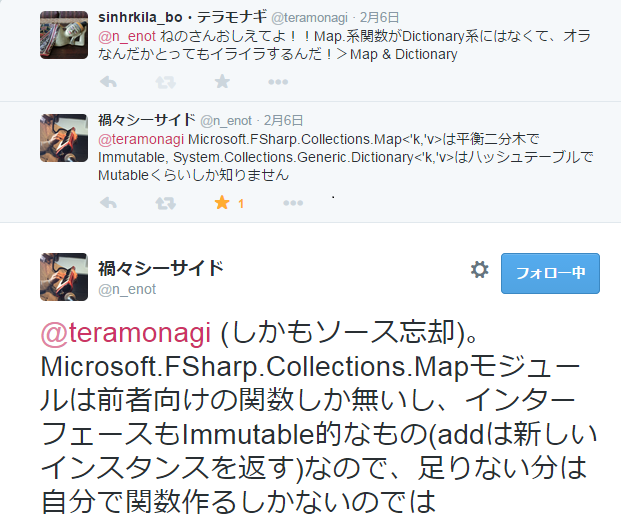type Hoge =
| A = 1
| B = 2
Full name: Document.Hoge
| A = 1
| B = 2
Full name: Document.Hoge
Hoge.A: Hoge = 1
Hoge.B: Hoge = 2
type Moge =
| M1 of Hoge
| M2
Full name: Document.Moge
| M1 of Hoge
| M2
Full name: Document.Moge
union case Moge.M1: Hoge -> Moge
union case Moge.M2: Moge
val length : type_name:System.Type -> int
Full name: Document.length
Full name: Document.length
val type_name : System.Type
namespace Microsoft.FSharp.Reflection
type FSharpType =
static member GetExceptionFields : exceptionType:Type * ?bindingFlags:BindingFlags -> PropertyInfo []
static member GetFunctionElements : functionType:Type -> Type * Type
static member GetRecordFields : recordType:Type * ?bindingFlags:BindingFlags -> PropertyInfo []
static member GetTupleElements : tupleType:Type -> Type []
static member GetUnionCases : unionType:Type * ?bindingFlags:BindingFlags -> UnionCaseInfo []
static member IsExceptionRepresentation : exceptionType:Type * ?bindingFlags:BindingFlags -> bool
static member IsFunction : typ:Type -> bool
static member IsModule : typ:Type -> bool
static member IsRecord : typ:Type * ?bindingFlags:BindingFlags -> bool
static member IsTuple : typ:Type -> bool
...
Full name: Microsoft.FSharp.Reflection.FSharpType
static member GetExceptionFields : exceptionType:Type * ?bindingFlags:BindingFlags -> PropertyInfo []
static member GetFunctionElements : functionType:Type -> Type * Type
static member GetRecordFields : recordType:Type * ?bindingFlags:BindingFlags -> PropertyInfo []
static member GetTupleElements : tupleType:Type -> Type []
static member GetUnionCases : unionType:Type * ?bindingFlags:BindingFlags -> UnionCaseInfo []
static member IsExceptionRepresentation : exceptionType:Type * ?bindingFlags:BindingFlags -> bool
static member IsFunction : typ:Type -> bool
static member IsModule : typ:Type -> bool
static member IsRecord : typ:Type * ?bindingFlags:BindingFlags -> bool
static member IsTuple : typ:Type -> bool
...
Full name: Microsoft.FSharp.Reflection.FSharpType
static member Reflection.FSharpType.GetUnionCases : unionType:System.Type * ?bindingFlags:System.Reflection.BindingFlags -> Reflection.UnionCaseInfo []
module Array
from Microsoft.FSharp.Collections
from Microsoft.FSharp.Collections
val map : mapping:('T -> 'U) -> array:'T [] -> 'U []
Full name: Microsoft.FSharp.Collections.Array.map
Full name: Microsoft.FSharp.Collections.Array.map
val u : Reflection.UnionCaseInfo
val field : System.Reflection.PropertyInfo []
member Reflection.UnionCaseInfo.GetFields : unit -> System.Reflection.PropertyInfo []
val length : array:'T [] -> int
Full name: Microsoft.FSharp.Collections.Array.length
Full name: Microsoft.FSharp.Collections.Array.length
namespace System
type Enum =
member CompareTo : target:obj -> int
member Equals : obj:obj -> bool
member GetHashCode : unit -> int
member GetTypeCode : unit -> TypeCode
member HasFlag : flag:Enum -> bool
member ToString : unit -> string + 3 overloads
static member Format : enumType:Type * value:obj * format:string -> string
static member GetName : enumType:Type * value:obj -> string
static member GetNames : enumType:Type -> string[]
static member GetUnderlyingType : enumType:Type -> Type
...
Full name: System.Enum
member CompareTo : target:obj -> int
member Equals : obj:obj -> bool
member GetHashCode : unit -> int
member GetTypeCode : unit -> TypeCode
member HasFlag : flag:Enum -> bool
member ToString : unit -> string + 3 overloads
static member Format : enumType:Type * value:obj * format:string -> string
static member GetName : enumType:Type * value:obj -> string
static member GetNames : enumType:Type -> string[]
static member GetUnderlyingType : enumType:Type -> Type
...
Full name: System.Enum
System.Enum.GetValues(enumType: System.Type) : System.Array
module Seq
from Microsoft.FSharp.Collections
from Microsoft.FSharp.Collections
val cast : source:System.Collections.IEnumerable -> seq<'T>
Full name: Microsoft.FSharp.Collections.Seq.cast
Full name: Microsoft.FSharp.Collections.Seq.cast
val length : source:seq<'T> -> int
Full name: Microsoft.FSharp.Collections.Seq.length
Full name: Microsoft.FSharp.Collections.Seq.length
val sum : array:'T [] -> 'T (requires member ( + ) and member get_Zero)
Full name: Microsoft.FSharp.Collections.Array.sum
Full name: Microsoft.FSharp.Collections.Array.sum
val typeof<'T> : System.Type
Full name: Microsoft.FSharp.Core.Operators.typeof
Full name: Microsoft.FSharp.Core.Operators.typeof
val lhs : Hoge
val rhs : Hoge
val A : Hoge
val x : Hoge
Full name: Document.x
Full name: Document.x
val x : int []
Full name: Document.x
Full name: Document.x
val maxX : int
Full name: Document.maxX
Full name: Document.maxX
val max : array:'T [] -> 'T (requires comparison)
Full name: Microsoft.FSharp.Collections.Array.max
Full name: Microsoft.FSharp.Collections.Array.max
val filter : predicate:('T -> bool) -> array:'T [] -> 'T []
Full name: Microsoft.FSharp.Collections.Array.filter
Full name: Microsoft.FSharp.Collections.Array.filter
val i : int
val mapi : mapping:(int -> 'T -> 'U) -> array:'T [] -> 'U []
Full name: Microsoft.FSharp.Collections.Array.mapi
Full name: Microsoft.FSharp.Collections.Array.mapi
val y : int
val elements : System.Array
Full name: Document.elements
Full name: Document.elements
val map : mapping:('T -> 'U) -> source:seq<'T> -> seq<'U>
Full name: Microsoft.FSharp.Collections.Seq.map
Full name: Microsoft.FSharp.Collections.Seq.map
val o : obj
val unbox : value:obj -> 'T
Full name: Microsoft.FSharp.Core.Operators.unbox
Full name: Microsoft.FSharp.Core.Operators.unbox

